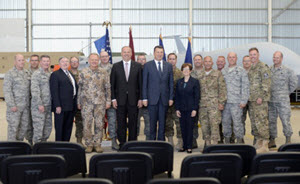Story by: 1st Lt. Alicia Lacy
Post: September 24, 2015
 1st Lt. Alicia Lacy
1st Lt. Alicia Lacy
Guests listen to speakers during a distinguished visitor and media day Sept. 8, 2015, at Lielvarde Air Base, Latvia. Officials invited distinguished guests and media to the air base to learn more about the 147th Reconnaissance Wing, Texas Air National Guard, and the Michigan National Guard's mission to fly the reconnaissance aircraft in its first non-combat deployment and its first flight in European air space. (Air National Guard photo by 1st Lt. Alicia Lacy/Released)
LIELVARDE AIR BASE, Latvia - The combined efforts of Air National Guardsmen from several states helped execute the first noncombat deployment of the MQ-1 Predator and its first flight in Eastern European airspace.
From mid-August to mid-September, airmen traveled to Latvia for the short deployment. The objectives achieved during the mobilization made the nation the prime option for remotely piloted aircraft operations in the Baltic region, said Lt. Col. Chris Recker, intelligence, surveillance and reconnaissance access and interoperability officer for United States Air Forces Europe-Africa.
Planning, airlift and the successful execution of the historical mission included the contributions from the Texas ANG’s 147th Reconnaissance Wing, the Michigan National Guard, the Tennessee ANG’s 164th Airlift Wing, the Mississippi ANG’s Airlift Wing, the TXANG’s 136th Airlift Wing and the New York ANG’s 105th Airlift Wing.
The deployment was nearly a 100 percent Air National Guard-executed mission, said Col. Stanley Jones, commander of the 147th Reconnaissance Wing, Texas Air National Guard. From the conception to fly the RPAs at Lielvarde to the coordination, airlift, equipment and personnel, the Air National Guard accomplished nearly all of the efforts to make the mission a success.
The contributions of all the units and agencies involved culminated with the first launch, operation and recovery of the Predator RPA on Sept. 1, 2015, at the Latvian air base.
“This is a really historic day for Latvia,” said Latvia’s defense minister, Raimonds Bergmanis. “It’s the first time this system has been deployed in Europe, and I’m really proud that Latvia is hosting this aircraft.”
In addition to meeting objectives from the Michigan National Guard, the 147th and USAFE, the deployment was in direct support of the European Reassurance Initiative.
The ERI is a president-directed, congressionally-approved funding effort to bolster the security and capacity of the United States’ NATO partners.
“We are doing a lot to strengthen security in the Baltic region,” said Latvian President Raimonds Vejonis.
The Michigan National Guard first conceptualized the idea to use Lielvarde Air Base for RPAs in September 2011 with Latvia’s State Partnership Program partners at the Michigan National Guard. From there, partnerships with the Michigan National Guard and several Latvian agencies, to include the Latvian Civil Aviation Authority, the Latvian National Armed Forces, Air Navigation Service Provider and the Riga Area Control Center helped make the execution of the historic flight possible.
With the flight of the Predator, Latvia became the first nation in Europe to develop nationwide RPA flight procedures with countrywide corridors that tie into special use airspace to de-conflict civilian and military flights, as well as allowing for nationwide use of surveillance capabilities to support a range of government needs, from search and rescue to firefighting and border control, said Col. James Andrew Roberts, Combat Readiness Training Center commander, Michigan National Guard.
The mission not only included an exchange with Latvian armed forces on RPA operations, but troops from Lithuania and Estonia also participated in the training mission to familiarize with air traffic management with MQ-1 operations, supporting one of the ERI’s objectives.
“The ERI is an important piece in European security,” echoed Lt. Gen. Raimonds Graube, the Latvian chief of defense.
The ERI demonstrates the steadfast commitment of the U.S. its NATO and European partners through a persistent, rotational presence of U.S. forces and by increasing the responsiveness of U.S. forces to contingencies in Central Europe.